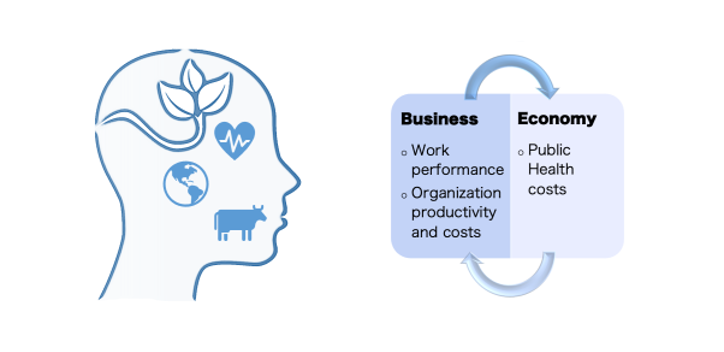Researcher Network member, Jana Krizanova, explores the effects of a vegan diet on workplace productivity and the implications for public health.

Unhealthy dietary habits lead to reduced levels of wellbeing, which relates to increased inability to work, a common cause of absenteeism (Głąbska et al, 2020) . Higher rates of absenteeism translate for organisations into reduced productivity and performance (Kocakulah et al, 2016) People suffering from lower physical and psychological wellbeing has an impact on higher costs for public health. In addition, the recent COVID-19 pandemic has been a wake-up call to redesign public health strategies in order to improve wellbeing and reduce public health expenses. The aim of this theoretical review is to analyse plant-based diets, particularly the vegan diet, from an economic and business perspective in relation to employees´ work performance and public health costs.
Employees’ wellbeing and performance
If employees are unable to work, companies cannot produce in amount and time as planned. Therefore health-related absenteeism becomes a threat for a company’s productivity and profit increasing its direct and indirect costs (Kocakulah et al. 2016) . Furthermore, this may have negative repercussions on its image. In figures, research conducted in Ohio reports that small businesses are losing $60,000 per year while for the large organisations the costs reach $3.6 million annually (Truman, 2003). One possible solution to tackle health-related absenteeism is the implementation of Employee Assistantship Programmes (EAP) including traits such as counselling for mental health, nutrition and lifestyle management in order to enhance performance by increasing employees’ wellbeing and involvement and organisation productivity (Chlebanova, 2020.) EAP has a positive influence on employees’ wellbeing and also helps in building a health-oriented company culture. This initiative conducts towards health promotion and health-oriented leadership at the workplace. This is particularly useful since transformational or employee-oriented management exerts a positive effect on employee health (Hager, 2020), creating a fertile soil for an organisational culture improvement, which is another way to create more productive and successful organisations. In this vein, Levering and Moskowitz (2003) analysed 100 Best Companies to Work and found that programmes implementing absenteeism reduction promote workers morale and the bottom line of the organisation. In addition, stress reduction and healthy eating habits lead to better employer branding, working atmosphere and performance (Puchalski & Korzeniowska, 2019). Having allocated several factors needed to take care of when dealing with employees’ wellbeing, the holistic 9-dimension organisational wellbeing model (depicted below) enables us to implement individual elements of wellbeing into an organisation’s life (AVMA, 2020; Chlebanova, 2020).

In accordance with prior evidence, one way to promote employees’ nutrition care at the workplace is by raising awareness of veganism and supporting this lifestyle. A well-designed plant-based diet - including fruits, vegetables, wholegrains, and legumes (chickpeas, beans, etc.), while excluding all animal products - is suitable for all stages of lifespan (Janda & Trocchia, 2001; Alvaro, 2017; Ostfeld, 2017). Besides its triple dividend for supporting human health, environmental preservation and animal rights, veganism may also exert a positive influence for organisational and public health purposes.
Employees’ wellbeing and performance in relation to veganism
Prior works on vegan diets at the workplace suggest that people following plant-based diets incur a lower absenteeism compared to omnivores. Accordingly, vegan nutrition intervention programmes at the workplace can improve physical and mental health (depression, anxiety, emotional wellbeing), vitality and productivity. More specifically, people following the vegan diet reported a 40–46% decrease in health-related productivity impairments at work (Katcher et al,2010; Agarwal et al, 2015). This is very useful for building a healthy atmosphere and organisational culture at the workplace. In addition to this, vegan dietary habits have been shown to support better cardiometabolic outcomes and quality of life in healthcare workers at the height of the COVID-19 pandemic (Kahleova et al. 2021).
Veganism, public health and the COVID-19
The recent COVID-19 pandemic has inflicted burden on public health costs in numerous countries. However, a recent study found that following a plant-based diet is reported to 73% lower odds of moderate-to-severe COVID-19 illness (Kim et al, 2021). Furthermore, following a plant-based diet promotes physical and mental conditions in people living with “Long COVID” symptoms (Storz, 2021).
In addition, from the public health perspective, a vegan dietary transition could reduce global mortality by 6-10% for a future scenario in 2050. Decreased mortality could translate in savings reaching 30 trillion US dollars (13% of GDP) if we shifted towards a healthy vegan diet. A vegan shift could possibly help in savings on illness treatment, obtaining large economic gains of as much as 1.67 billion US dollars (3.3% of GDP) (Springmann et al, 2016). This dietary shift could liberate new resources to areas that are currently underdeveloped and thus improve overall care and service to all patients.
In conclusion, a large-scale promotion of plant-based diets constitutes a tool for health-oriented business management and public health policies seeking work performance and productivity improvement, while reducing health-related costs. In order to reach such an ambitious goal, the government should design supporting solutions to increase interest in implementation of plant-based nutritional programmes at the workplace and schools, while in parallel optimising public health budget. Additionally, health practitioners should promote more proactively plant-based diets for health-care workers and patients in order to improve health and optimise public health costs.
Comment from The Vegan Society Dietician Team:
Supporting people to eat well at work and beyond can help them to optimise their wellbeing – it’s a fantastic public health opportunity and a win-win situation for employees and employers. An array of resources about vegan nutrition is available at vegansociety.com/nutrition
The views expressed by our Research News contributors are not necessarily the views of The Vegan Society.
References
- 1. Agarwal, U., Mishra, S., Xu, J., Levin, S., Gonzales, J., & Barnard, N. D. (2015). A multicenter randomized controlled trial of a nutrition intervention program in a multiethnic adult population in the corporate setting reduces depression and anxiety and improves quality of life: the GEICO study. American Journal of Health Promotion, 29(4), 245-254.
- 2. Chlebanova, L. (2020) PROMOTING THE WELL-BEING OF SOCIAL WORKERS IN THE CONTEXT OF ORGANIZATIONAL CULTURE AND THE COVID - 19 CRISIS. CER Comparative European Research 2020.
- 3. Głąbska, D., Guzek, D., Groele, B., & Gutkowska, K. (2020). Fruit and vegetable intake and mental health in adults: a systematic review. Nutrients, 12(1), 115.
- 4. Hofstede, G., Hofstede, G. J., & Minkov, M. (2005). Cultures and organizations: Software of the mind (Vol. 2). New York: Mcgraw-hill.
- 5. Kahleova, H., Berrien-Lopez, R., Holtz, D., Green, A., Sheinberg, R., Gujral, H., ... & Barnard, N. D. (2021). Nutrition for Hospital Workers During a Crisis: Effect of a Plant-Based Dietary Intervention on Cardiometabolic Outcomes and Quality of Life in Healthcare Employees During the COVID-19 Pandemic. American Journal of Lifestyle Medicine, 15598276211050339.
- 6. Katcher, H. I., Ferdowsian, H. R., Hoover, V. J., Cohen, J. L., & Barnard, N. D. (2010). A worksite vegan nutrition program is well-accepted and improves health-related quality of life and work productivity. Annals of Nutrition and Metabolism, 56(4), 245-252.
- 7. Kim, H., Rebholz, C. M., Hegde, S., LaFiura, C., Raghavan, M., Lloyd, J. F., ... & Seidelmann, S. B. (2021). Plant-based diets, pescatarian diets and COVID-19 severity: a population-based case–control study in six countries. BMJ Nutrition, Prevention & Health, 4(1), 257.
- 8. Kocakulah, M. C., Kelley, A. G., Mitchell, K. M., & Ruggieri, M. P. (2016). Absenteeism problems and costs: causes, effects and cures. International Business & Economics Research Journal (IBER), 15(3), 89-96.
- 9. Ostfeld RJ. Definition of a plant-based diet and overview of this special issue. J Geriatr Cardiol. 2017;14(5):315.
- 10. Puchalski, K., & Korzeniowska, E. (2019). HEALTH PROMOTION IN MEDIUM-SIZED AND LE COMPANIES IN POLAND IN 2017--ACTIVITIES, IMPLEMENTATION, EFFECTS AND DIFFICULTIES/PROMOCJA ZDROWIA W SREDNICH I DUZYCH FIRMACH W POLSCE W 2017 R.--ROZPOWSZECHNIENIE, REALIZACJA, EFEKTY I TRUDNOSCI. Medycyna Pracy, 70(3), 275-295.
- 11. Springmann, M., Godfray, H. C. J., Rayner, M., & Scarborough, P. (2016). Analysis and valuation of the health and climate change cobenefits of dietary change. Proceedings of the National Academy of Sciences, 113(15), 4146-4151.
- 12. Storz, M.A. Lifestyle Adjustments in Long-COVID Management: Potential Benefits of Plant-Based Diets. Curr Nutr Rep 10, 352–363 (2021).

